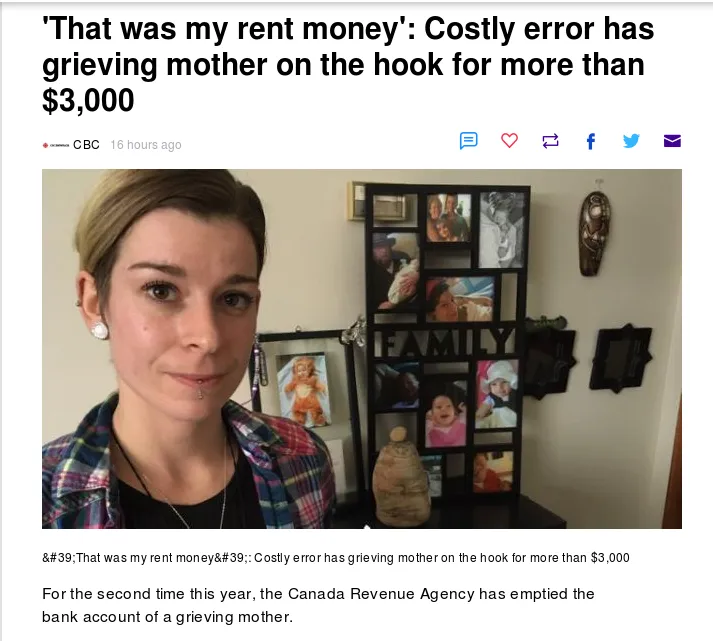
The following represents one minor contemporary example of centralized government draconian policies and subsequent enforcement powers in regards to access and control of your money. In this example, the Canada Revenue Agency (CRA) had the legal ability to freeze a bank account thus depriving the owner of much needed funds. As usual, such events are often unnoticed until it is too late to effectively take any countermeasures, like withdrawing your savings or funds. As a result, the citizen victim is often left in economic distress with little help save for the generosity of family and friends. In such a situation, having a contingency plan would enable one to bypass or counter the immediate effects of having one's monetary access cut off.
As the victim in this case reveals: "A few days before, I had my U-Haul packed, the CRA went and froze my bank account, froze my visa and took every cent out of my savings. Me, with no job," she said. "So it was almost $650 they took in one day." In addition, she goes on to state, " the CRA emptied her bank account again, leaving her unable to pay for food, rent, power or phone."
Incidentally, it was not until she had contacted the media, namely CBC News in Canada and her local Fredericton MP Matt DeCource, that she was able to receive a suitable response and semi-equitable solution from CRA. irrespective of the response, she was still unable to gain access to her funds until a predetermined time had passed. "CRA apologized, agreed on a reasonable repayment schedule and said the money taken from her account would be returned in full in the next six to eight weeks.
Can you wait six to eight weeks time to gain access to your funds in the event some individual or worse, some Statist government entity had control? Could you survive? How many people have emergency funds (fiat) stashed away in a cubbyhole or mattress or even house safe to last that long? How would you pay your rent, utilities or purchase food, let alone have adequate funds to commute to work.......
If anything, stories such as these help reinforce the decentralized crypto-currency revolution. In this scenario, having a good portion or most of your funds converted anonymously into crypto holdings would be wise. Perhaps only keeping a bare minimal amount in the cheapest bank account, with minimal balance requirements - enough in order to avoid monthly fees would be the best solution. The rest should be stored in an external hardware wallet such as a Trezor or Ledger in which you would have sole responsibility and access. The bottom line is to be cognizant of who has access and when concerning your funds. Fiat does not enable individual or private solitary access. Transactions are tracked and accounted for and reported as well as the bank having the proverbial "private key" which enables such entities to freeze your account and even empty it's contents pending a change in the geopolitical or economic environment. If anything, as stories such as these surface, the masses may find cryptocurrency a worthy deterrent to organized government theft.
Reference:
Yahoo CA Original Article: https://ca.finance.yahoo.com/news/apos-rent-money-apos-costly-114802247.html